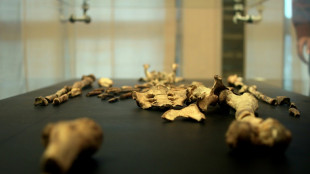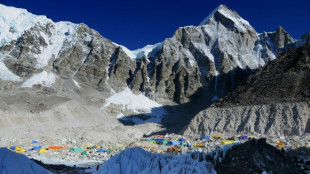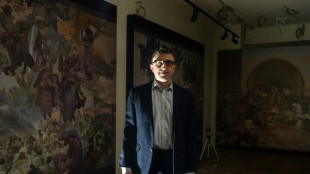
-
 Mbappe out for Real Madrid cup game as Ancelotti backs ref complaints
Mbappe out for Real Madrid cup game as Ancelotti backs ref complaints
-
AI regulation around the world

-
 Gut-Behrami tops downhill training, Vonn coasts
Gut-Behrami tops downhill training, Vonn coasts
-
Myanmar junta bans possible conscripts from foreign travel

-
 Israel commits to new Gaza talks ahead of Trump meeting
Israel commits to new Gaza talks ahead of Trump meeting
-
Tottenham defender Dragusin faces knee surgery

-
 Stocks rebound, dollar dips as Trump delay tariffs
Stocks rebound, dollar dips as Trump delay tariffs
-
England wing Murley out of France Six Nations clash

-
 Tequila maker Diageo axes sales target on Trump tariffs
Tequila maker Diageo axes sales target on Trump tariffs
-
Prague museum to host first European display of 3.18 million year old Lucy

-
 Where things stand in China-US trade tensions
Where things stand in China-US trade tensions
-
Japan's Olympic pool-sized sinkhole highlights risk of old pipes

-
 At Damascus opera house, hopes for a better future
At Damascus opera house, hopes for a better future
-
Double Olympic champion Gu out of Asian Winter Games with injury

-
 Frenchman on death row in Indonesia leaves jail ahead of transfer home
Frenchman on death row in Indonesia leaves jail ahead of transfer home
-
Japan PM to meet Trump on Feb 6-8 US trip

-
 Asian stocks and peso rise on Trump's Mexico, Canada tariff delay
Asian stocks and peso rise on Trump's Mexico, Canada tariff delay
-
Panama lawsuit requests axing Hong Kong firm's canal concession

-
 Nepal hikes Everest climbing fee by a third
Nepal hikes Everest climbing fee by a third
-
OpenAI chief Altman signs deal with South Korea's Kakao after DeepSeek upset

-
 UBS profit beats forecast as Credit Suisse merger nears end
UBS profit beats forecast as Credit Suisse merger nears end
-
Nintendo cuts net profit forecast as Switch sales slow

-
 Netanyahu to meet Trump as Israel, Hamas eye Gaza truce talks
Netanyahu to meet Trump as Israel, Hamas eye Gaza truce talks
-
China says to probe Google over anti-monopoly violations

-
 China slaps tariffs on US energy, vehicles in trade war sparring
China slaps tariffs on US energy, vehicles in trade war sparring
-
Frenchman on death row in Indonesia to return home

-
 Brunson scores 42 as Knicks bounce back, Thunder rout Bucks
Brunson scores 42 as Knicks bounce back, Thunder rout Bucks
-
China hits back at US with levies as Trump tariffs come in force

-
 Musk takes reins of US Treasury payments, sparking lawsuit
Musk takes reins of US Treasury payments, sparking lawsuit
-
DR Congo, Rwanda leaders to join summit on crisis in war-torn east

-
 Mahomes and Chiefs take on villain role as Super Bowl hype begins
Mahomes and Chiefs take on villain role as Super Bowl hype begins
-
OpenAI chief Altman inks deal with S. Korea's Kakao after DeepSeek upset

-
 Syria leader heads to Turkey to discuss rebuilding, Kurds
Syria leader heads to Turkey to discuss rebuilding, Kurds
-
Paris, the village of light in Kyrgyzstan's rugged mountains

-
 How China could respond to Trump's new tariffs
How China could respond to Trump's new tariffs
-
Trump to host Netanyahu for crucial Gaza ceasefire talks

-
 'Art for everyone': Mucha's masterpiece to find home in Prague, 100 years on
'Art for everyone': Mucha's masterpiece to find home in Prague, 100 years on
-
Trump halts Canada and Mexico tariffs, China still targeted

-
 Apple blasts porn app for iPhones in Europe
Apple blasts porn app for iPhones in Europe
-
Stocks and peso boosted by Trump's Mexico, Canada tariff delay

-
 France pitches AI summit as 'wake-up call' for Europe
France pitches AI summit as 'wake-up call' for Europe
-
Hundreds march in New York against Trump's trans policy

-
 Lindsey Vonn: World Ski Championships throwback
Lindsey Vonn: World Ski Championships throwback
-
Neymar homecoming is reminder of promise unfulfilled

-
 Eliasch offers 'hope' and big revenue growth for IOC's 'phenomenal brand'
Eliasch offers 'hope' and big revenue growth for IOC's 'phenomenal brand'
-
Attempted murder trial of Rushdie assailant to begin

-
 Musk's US government 'takeover' sounds alarm bells
Musk's US government 'takeover' sounds alarm bells
-
Ecuadoran drug gangs turn to death saint for protection

-
 Women players beat the odds to cut a path for ice hockey in Iran
Women players beat the odds to cut a path for ice hockey in Iran
-
In fire-ravaged Los Angeles, a long road of rebuilding


At Damascus opera house, hopes for a better future
To applause, percussionist Bahjat Antaki took the stage with Syria's national symphony orchestra, marking the first classical concert at the Damascus opera house since president Bashar al-Assad’s ouster.
The concert was a way of saying "we are here and able to produce art," despite more than years of devastating war, Antaki told AFP after last week's performance, which drew an audience of hundreds.
"We will continue, and we will be stronger and more beautiful," the 24-year-old said.
After Islamist-led rebels ousted Assad on December 8, the orchestra's rehearsals and concerts were halted as Syria embarked on a delicate transition away from decades of one-family rule enforced by a repressive security apparatus.
While the country has breathed a sigh of relief, many in the capital -- known for being more liberal than other parts of the country -- have expressed apprehension about the direction the new Islamist leaders may take on personal freedoms and potentially the arts.
The new authorities have said repeatedly they will protect Syria's religious and ethnic minorities, and that the country's transition will be inclusive.
"There aren't fears, but worries," said violinist Rama al-Barsha before going onstage.
"We hope for more support -- under the old regime, we had no financial aid or even symbolic support," the 33-year-old said.
The concert was conducted by Missak Baghboudarian, a member of Syria's Armenian minority, and included works by Beethoven and Tchaikovsky but also by Syrian composers.
In the audience were European and Gulf Arab diplomats as well as new Health Minister Maher al-Sharaa and his family.
- Homage 'to the martyrs' -
Sharaa is the brother of interim president Ahmed al-Sharaa, who until recently led the Islamist group that spearheaded the offensive against Assad.
The group, Hayat Tahrir al-Sham has its roots in Syria's former Al-Qaeda affiliate but cut ties in 2016.
Last month, the opera house also hosted its first concert by well-known Islamic music singer known as Abu Ratib, who returned after decades in exile for his political views and whose recordings until recently were sold in secret.
The orchestral performance paid homage "to the martyrs and the glory of Syria".
A minute's silence was held for the more than 500,000 people killed during the civil war which erupted after Assad brutally repressed anti-government protests in 2011.
Images of the destruction wreaked by more than 13 years of fighting were projected on the back wall of the stage, along with pictures of mass demonstrations.
Also shown were photographs of Alan Kurdi, the toddler who became a tragic symbol of the Syrian refugee crisis when his tiny body was washed up on a Turkish beach in 2015 after his family's failed attempt to reach EU member Greece by small boat.
- 'The Syria we want' -
In a reminder of the heavy economic cost of the war, the venue was unheated for the concert despite the winter cold.
Organisers said they could not afford the fuel, and both musicians and technical staff performed for free.
Audience member Omar Harb, 26, acknowledged concerns about the future of the arts in Syria's Islamist-led political transition but said after the performance that "it seems that nothing will change".
"We hope that these events will continue -- I want to come back again," said the young doctor, after watching his first concert at the opera house.
Yamama al-Haw, 42, said the venue was "a very dear place".
"What we see here today is the Syria that I love... the music, the people who have come to listen -- that's the best image of Damascus," she said, beaming, and wearing a white hijab.
She expressed optimism that the country was headed towards "better days".
"Everything suggests that what will come will be better for the people... we will have the Syria we want."
D.Lopez--AT
